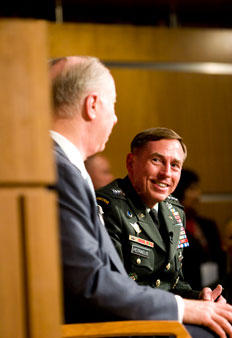By Alexi White
At HKS, prestige is the currency that matters most. Fame can get you access to the inner circle, but beware the fall from grace. It’s on your way down that the knives come out.
This is the principal lesson to be learned from our school’s complex history with Paula Broadwell, the former-PhD-candidate-turned-best-selling-author. It was thanks to the Kennedy School that her fateful 2006 encounter with General David Petraeus took place, and it is thanks to the Kennedy School that her academic reputation has been so publicly and deeply tarnished.
On Nov. 14, the Boston Globe ran an expose of Broadwell’s academic record in which two Kennedy School professors anonymously criticized her academic performance. One described her as a “personality” and not a critical thinker, charging that what she lacked in brains she made up for in shameless self-promotion. Even if this professor has never engaged in self-promotion on their way to a job at HKS (an unlikely assumption), our school unabashedly encourages ambition, networking and other forms of self-promotion as a way to achieve one’s career goals and accumulate prestige, rendering this critique of Broadwell manifestly hypocritical.
The second professor revealed that when Broadwell could not handle her PhD requirements, she opted to switch into a Masters program, and that this failure was “deeply embarrassing” to the Kennedy School.
If anything is deeply embarrassing to the Kennedy School, it is certainly the conduct of these professors. There is a considerable power imbalance inherent to the professor-student relationship, and to take the intimate knowledge gained through this relationship and use it against a student is a terrible betrayal of trust. If ethics are an insufficient reason to hold one’s tongue, consider that revealing details of a student’s academic history in this manner is certainly a violation of the spirit, and possibly the letter, of the Family Educational Rights and Privacy Act.
Ironically, these comments were published just a day after the Globe reported that, despite their best efforts, “More than a half-dozen of Broadwell’s classmates at Harvard declined to characterize her work or describe her personally.” It would seem that, when it comes to integrity, the Kennedy School has much to learn from its students.
That these HKS professors chose to conceal their identities makes it nearly impossible to hold them accountable, suggesting a level of cowardice. Their defense, which rests on the sensitive nature of the ongoing investigations, is undermined by the decision of professors from Kings College London and Tuft’s University to speak on the record in the same article. The only difference is that the Kennedy School professors had nasty things to say.
Given the clear distain exhibited toward Broadwell and the concerns expressed regarding her intellectual capacity, it is interesting that she was welcomed back to the Kennedy School after her biography on General Petraeus became a bestseller. This past September, Broadwell was invited to participate in a Forum event on inspiring public service, and she is currently a research affiliate at the Center for Public Leadership. Only David Gergen, the director of the CPL, has had the courage to defend the school’s relationship with Broadwell.
I have spoken to students, faculty and administrators who are deeply discouraged by the picture of the Kennedy School and its faculty that has emerged as a result of this scandal. It hints at an unhealthy addiction to prestige and a deficit of integrity, and it should trouble our community as a whole. So far, our administration has done nothing to reach out to current or former students and reassure them that the comments of these professors are not acceptable. The school’s silence quietly appears to condone the anonymous comments, which is disquieting for those who may be thinking that being skewered by the media is one thing, by your alma mater, quite another.
